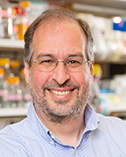
Michael K. Rosen
The University of Texas Southwestern Medical Center
|
Primary Section: 21, Biochemistry Secondary Section: 29, Biophysics and Computational Biology Membership Type:
Member
(elected 2020)
|
Biosketch
Michael Rosen received B.S. and B.S.E. degrees in Honors Chemistry and Chemical Engineering from the University of Michigan in 1987. He was a Winston Churchill Foundation Scholar in Allen Battersby’s laboratory at the University of Cambridge in 1987-8. He received his Ph.D. in 1993 from Stuart Schreiber’s laboratory in the Harvard Chemistry Department for structural and biochemical studies of FKBP12. He was a Damon Runyon-Walter Winchell postdoctoral fellow in the laboratories of Lewis Kay and Tony Pawson at the University of Toronto and the Samuel Lunenfeld Research Institute from 1993-1995. There he studied autoinhibition of the Crk protein and developed methods for selective methyl group labeling of proteins in a deuterated background, enabling NMR studies of large macromolecules. Rosen began his independent laboratory in the Cellular Biochemistry and Biophysics Program at the Memorial Sloan-Kettering Cancer Center, and Department of Biochemistry and Structural Biology at Weill Cornell Medical College in 1996. He joined the Department of Biochemistry at UT Southwestern Medical Center in 2001, and was elected into the Howard Hughes Medical Institute in 2005. In 2012 he was named the inaugural Chair of the Department of Biophysics, and holds the Mar Nell and F. Andrew Bell Chair in Biochemistry.
Research Interests
We seek to understand the formation, regulation, and functions of cellular compartments termed biomolecular condensates. These evolutionarily conserved structures concentrate diverse but specific groups of molecules without a surrounding membrane. Condensates are found across the biological spectrum, and contribute to processes including RNA metabolism, gene regulation and signal transduction. Many condensates appear to form through the physical process of liquid-liquid phase separation. Using a range of techniques, including biochemical reconstitution and in vitro and cellular microscopies, we investigate phase separation in both engineered and natural condensates. The former, in their simplified nature, enable precise isolation of key molecular parameters governing condensate behaviors, revealing general principles. The latter allow demonstration of these principles in more complex natural biochemical and cellular systems. Current efforts are directed toward understanding how the composition and physical properties of multi-component condensates arise from interactions among their constituents, how aberrant condensates drive cell transformation and cancer, how phase separation may contribute to genome organization, how small molecules selectively partition into or are excluded from condensates, and how amino acid sequence dictates homo- and heterotypic phase separation of intrinsically disordered proteins. Ultimately, we seek to understand cell organization on scales spanning nanometers to microns.

